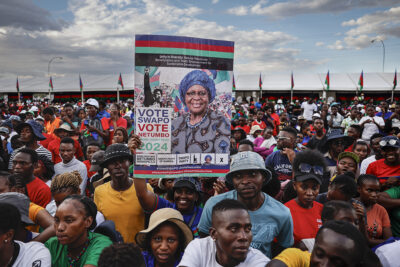Amid the COVID-19 pandemic, high levels of unemployment, and worsening racial injustices, the US stock market has remained buoyant, showing a very quick recovery after initial losses in March 2020. The stock market—supported by the monetary policy of the Federal Reserve, the fiscal policy of the federal government, and capital from private investors—once again reflected the country’s socioeconomic disparities. Along with those who asked “why the stock market is rising amidst a pandemic and record racialized inequality,” this apparent contradiction provides a reminder of how financialization in the US has been uninhibited by rising socioeconomic inequality, to which it has often been understood as contributing. Seeking to address these inequalities, some arguments have proposed abolishing capital and implementing “coöperation” as an alternative, encouraging us to imagine socialities and worlds beyond those the stock market can achieve. In one such argument, Bernard Harcourt describes capital as “transferrable ownership shares of publicly traded companies”—a definition that helps clarify what alternative structures of economy not based on “gambling” on other people’s lives might look like.
Drawing on intensive fieldwork that I have been conducting since 2020 in US investment companies that offer halal (Islamically permissible) and socially responsible investment, I examine here how these organizations respond to the inequalities of financialization. In particular, I point to some of the limitations of these responses, turning to abolitionism to imagine new forms of care-based sociality as alternatives to the kind of social life shaped by the stock market.
The abolitionist movement is primarily a response to the prison industrial complex, but it speaks to issues beyond punishment and imprisonment, providing a powerful resource for thinking about social worlds based on care rather than financial capitalism. Therefore, it is crucial to engage Ruth Wilson Gilmore’s views about how abolition encourages spending for human life instead of saving. She observes that “No abolitionist who is a true abolitionist wants to save money. What we want is for the money to be spent, to enhance, and support human life so that it can flourish in a way that doesn’t destroy the planet. We’re not about cost-savings.” For Gilmore, saving capital implies ignoring the human lives that are oppressed due to the power of capital. These arguments also echo conversations about racial capitalism, in which capitalism is understood as a product of racial formations. In this view, class, race, and gender are all directly connected to capitalism.
Drawing on this literature, I analyze the claims made by halal and/or socially responsible investment organizations that finance can serve a positive social function, through environment, social, and governance (ESG) screenings, and through notions such as socially responsible, sustainable, and impact investment. I draw on this research to argue that the current structure of the stock market is preventing us from building social relationships based on care. This argument is part of my broader dissertation research, in which I explore how Muslims in America are involved in this intersection of finance, justice, and philanthropy through innovative philanthropic organizations and Islamic ethical and socially responsible investment companies. My argument also considers religion as an analytic category to understand social relationships at the intersection of capital, justice, and technology. As Kathryn Lofton demonstrates, corporations and the market, just like religion, organize social life through powerful disciplinary gazes. Echoing alternative socialities, such as those Elayne Oliphant explores in France, as well as mutual aid campaigns and solidarity economies across contexts, this essay is engaged in the work of imagining a social life that relies on caring and supportive communal relationships.
While my fieldwork is grounded in halal investment companies, I begin with an example from a different site: my own institution, the University of California (UC). Like many institutions of higher education, UC provides a special fund that claims to be based on social equity for its employees’ retirement accounts. UC Social Equity Funds include a screening tool that uses social and environmental criteria to choose individual stocks. It is an example of how emerging forms of capitalism attempt to use finance for social change. Among the top ten holdings of UC Social Equity Funds, as published on March 31, 2020, are Apple Inc., Amazon.com Inc., and Facebook Inc. (Class A). As one of my interlocutors, an investment advisor from a well-known US-based investment company, told me, sustainable and impact investment always eventually includes investments in corporations that are not innocent of various forms of injustice. For example, Apple has a record of human rights violations in their supply chains, Amazon mistreats its warehouse workers, Facebook is complicit in genocide in places such as Myanmar, and so on. The purpose of impact investment is lost when these funds continue to invest in complicit corporations. In this context, suggestions that the stock market might enable economic uplift miss the fact that investing in the stock market means investing in complicit corporations.
My conversations with investment advisors in halal investment companies share similarities with the UC case, suggesting that both technical questions and underlying issues are consistent across different institutional contexts. Halal investment commonly means avoiding investing in religiously forbidden practices, including but not limited to excess debt and the weapons industry. In addition, most halal investment companies in the United States claim that their portfolios are not only halal but also socially responsible, impactful, and sustainable. That is, many of these companies are also part of conversations on ESG screenings, ethical investment, and other similar practices. My interlocutors articulated the connection between these different forms of investment in various ways: some saw “socially responsible investment as a secular form of halal investment,” while others considered socially responsible investment as a religious practice and a way of enacting Islamic teachings. Yet in all cases, the technical questions are similar, centering on strategies like screening processes as a way to choose stocks and funds selectively, and shareholder advocacy as a way to affect corporate decisions. Yet these measures seem incapable of solving the larger problem: investment in financial capitalism itself means perpetuating inequalities.
All of my interlocutors are conscientious in their choices of mutual funds, ETFs, and individual stocks as they pursue halal and/or socially responsible investment. Some are hopeful that shareholder advocacy can help change any injustices corporations might be involved in; as one interlocutor told me, “Justice is at the center of our company. For example, we never invest in private prisons.” Others are less hopeful about changing corporations but believe that ESG screenings help people fulfill their individual responsibility to do social good: “at least we can do what we can do.” Some think that corporations are likely to avoid conspicuous injustices or might fix their own mistakes so as to avoid negative headlines. Finally, some prioritize impact investment even though they are pessimistic about the extent of their influence because of the small size of their company. Many believe that avoiding interest—an approach that has been understood as a common indicator of Islamic finance—is not a strong enough criterion for judging what counts as “good” in finance. Some hold European stock market regulations in high esteem and believe that the stocks of corporations that harm society could be removed from the market. Yet no matter how these companies engage with investment and justice, their investment in corporate structures implies potential perpetuation of inequalities of capitalism. Ultimately, most of the halal investment companies, like other companies that offer sustainable, socially responsible, and impact investment, doengage with questions of justice and the stock market—but this engagement does not directly face the broader operation of the stock market.
Whether in the UC’s social equity funds or the portfolios of halal investment companies, stock shares always aim to produce profit for shareholders rather than to distribute wealth in a just way. These funds often include investments in corporations that reproduce injustices, even when they are subject to ESG screening or part of sustainable, socially responsible, and impact investment. The investor takes the corporation as a source of profit in the context of the stock market. What if, instead, one could invest in the lives of workers in these corporations? Abolitionist praxis allows us to reimagine social relationships—to imagine forms of sociality based on solidarity economies instead of being solely dedicated to profit-making. That is, a conversation about abolishing capital helps us see the discrepancy between forms of mutual care and forms of self-deception. This conversation allows us to imagine and practice democracy where wealth is not accumulated on behalf of the rich but circulates for the benefit of all. Whether we are talking about religious organizations, corporations, or universities, we can hold institutions accountable for injustices stemming from financialization by questioning our forms of sociality through the lens of abolition and rebuilding our social ties through the lens of solidarity.












